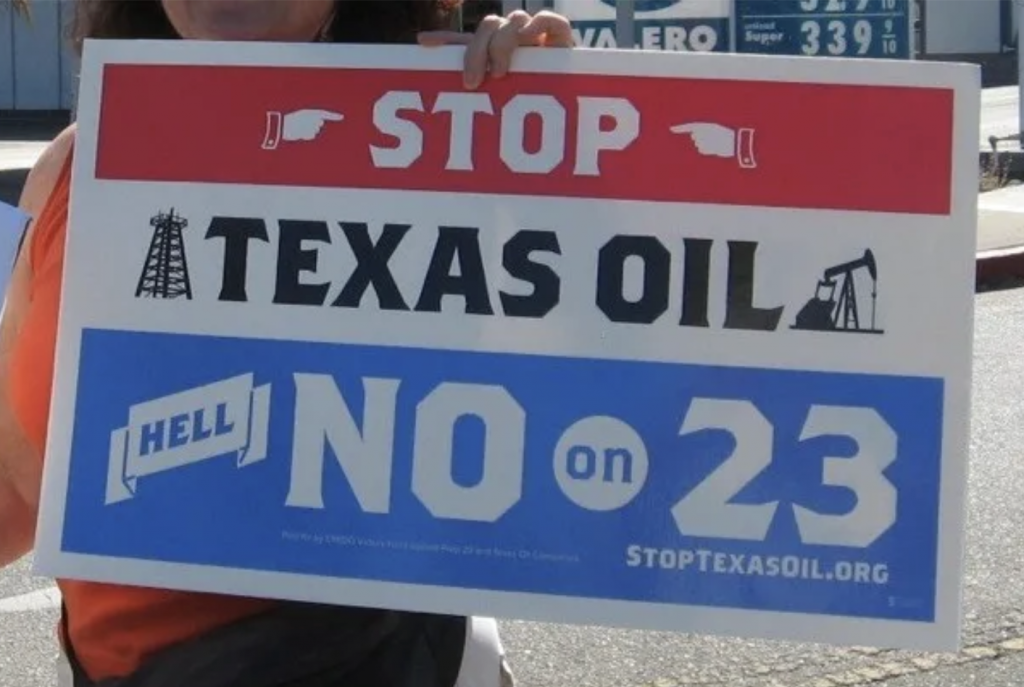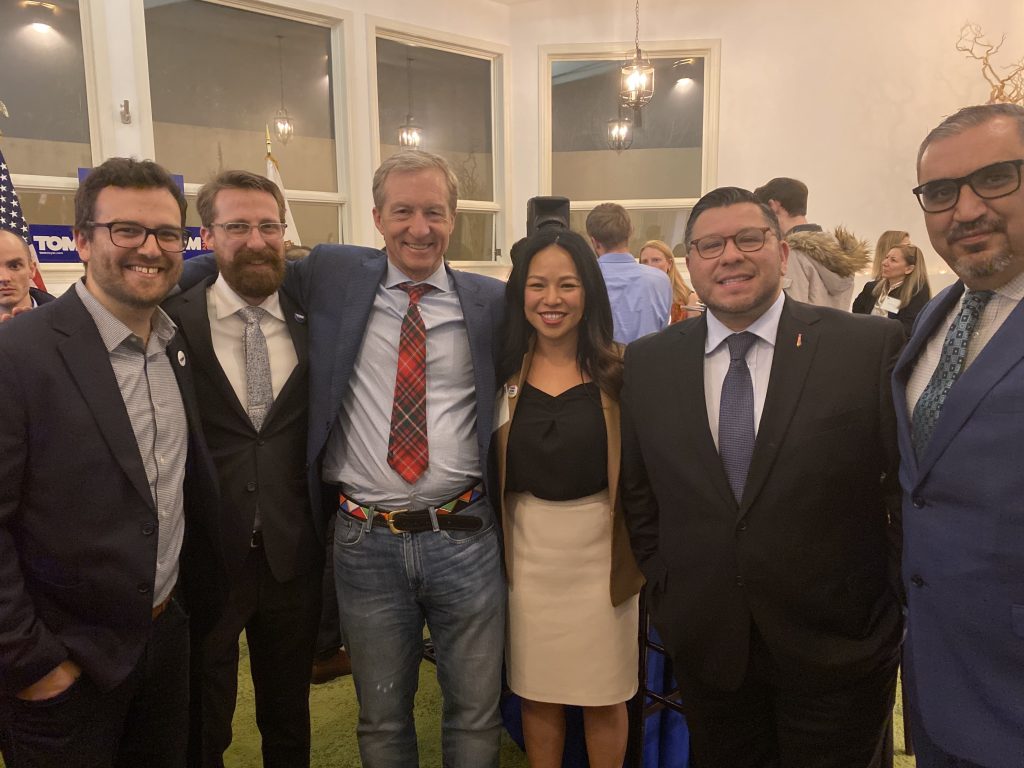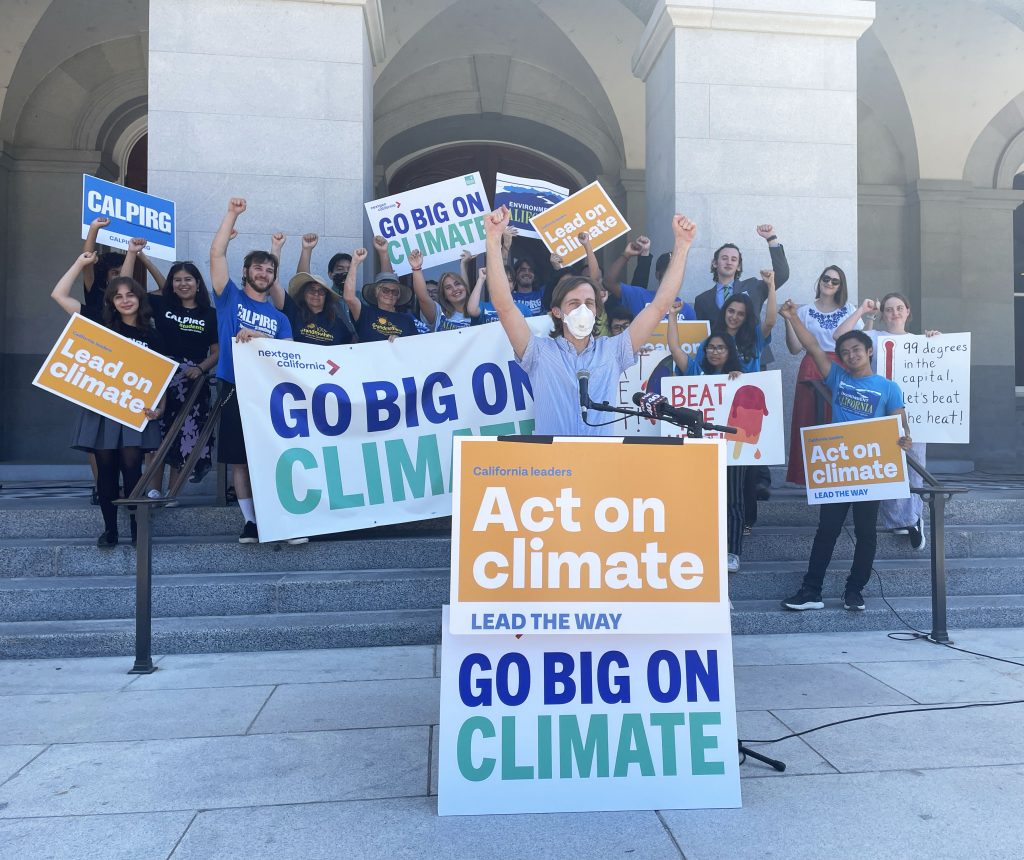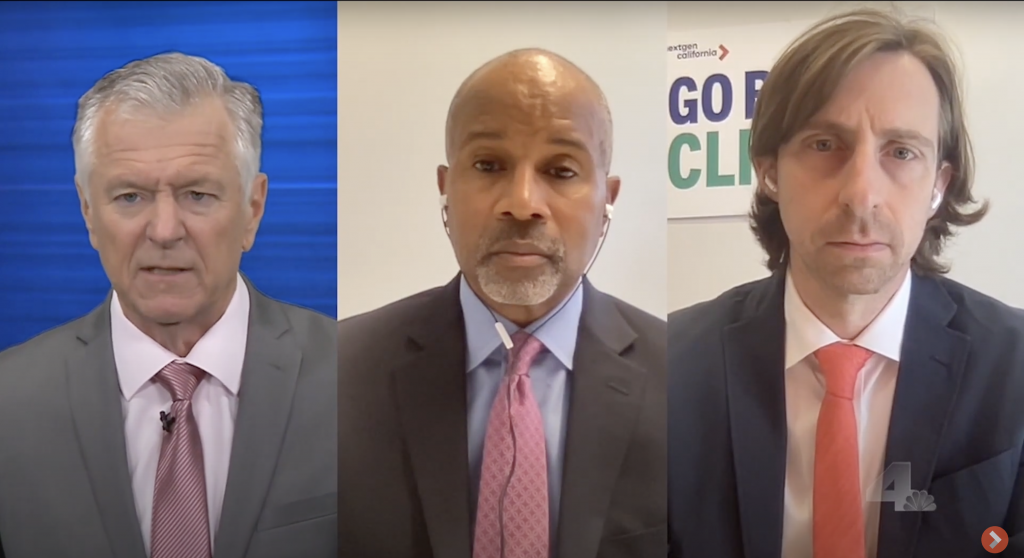
Let’s Talk… Climate Reflections on 10 Years of Climate Advocacy, and a Fond Farewell from Senior Policy Advisor David Weiskopf
July 26, 2024
“You are not obligated to complete the work, but neither are you free to desist from it.” – Pirekei Avot
This month, I am celebrating my tenth anniversary working with NextGen Policy. Through changing circumstances and times, I have maintained as a North Star the goal to advance climate policy that is informed by scientific reality, grounded in a commitment to justice, and built on the understanding of how political power dynamics shape and are shaped by our collective level of ambition. Today, as I prepare to begin the next chapter of my career I am taking a moment to look back on the arc of this decade to reflect on how far we’ve come and how much remains to be done.
The only permanent defeat is in surrender
I joined NextGen Policy (then called NextGen Climate America) in 2014, but my first introduction to this team’s work came in 2010, when I arrived at Stanford Law School. Before I entered the building for the first time, I grabbed a bumper sticker from a volunteer who was canvassing for support of California’s flagship Greenhouse Gas law, AB 32, which set a 40% pollution reduction target by 2030. An oil-funded ballot proposition to roll back – Proposition 23 – would have suspended the law and set back climate policy nationwide. We won.
The “No on 23” campaign was supported in large part by Tom Steyer. A few years later, Tom hired me as the second employee of his new climate policy team, which became NextGen Policy.

What I took away from the Prop 23 fight was that, whatever else climate policy may be, it is a fight. Along with Prop 23, another proposition, Prop 26 was on the ballot that year, and where Prop 23 failed, Prop 26 succeeded. Prop 23 would have suspended California’s landmark climate policy. Prop 26 made it much more difficult to build on that policy by characterizing Cap and Trade and many other functions of government as “taxes” and requiring a ⅔ legislative majority to enact them.
We have opponents. Powerful ones. And they have a virtually unlimited well of money and influence to deploy, thanks to their position in the fossil fuel industry: the most profitable enterprise that has ever existed on this planet. They will not be convinced or cajoled or shamed into signing the death warrants for their own golden goose; they must be defeated.
But this fight is long. No single victory will be decisive – the fight to limit the damage that fossil fuels can do to all life on this planet and to repair as much harm as possible will last beyond the lifetime of any person reading these words. We will have losses along the way, sometimes very painful ones, but no defeat is permanent as long as we choose to get up again and fight again.
Keep it simple: 100% clean and Zero Carbon

I joined NextGen in 2014, four years after the defeat of Prop 23. Congress had failed to pass Waxman-Markey or enact any new national climate law, and President Obama was preparing to exercise his authority under the Clean Air Act to place the first-ever limits on climate pollution from power plants, which were, at that time, the nation’s largest source of greenhouse gasses. My job was to work with partners to push the federal Environmental Protection Agency (EPA) to strengthen the rule before it was finalized.
In many important respects, we succeeded in our advocacy with EPA. Through a combination of expert analysis and collaborative discussions with an agency interested in doing the right thing, the final rule addressed many of our concerns. But these efforts proved moot when the Supreme Court took the extraordinary step of suspending implementation, citing “irrevocable harm” states would endure by planning to comply while litigation was pending. Despite the Court’s histrionics, their decision proved irrelevant to what happened in reality: 11 years before the rule was even set to take effect, the US power sector saw such steep pollution reductions that no additional reductions would be required under the rule.
This fight taught me that, no matter how modest your aims and how well-founded your actions, the fossil fuel industry will fight you with everything they have. There is no benefit from aiming low. Winning small is no easier than winning big.
Setting the right goals in my advocacy with EPA was difficult – how much, by when, based on what approaches? But it turns out that a much simpler approach is better. The correct policy is informed not by what seems possible, but by what is necessary. And what is necessary is 100% clean energy, for everyone, as fast as we can get it built. In California, thanks to the efforts of countless advocates (among whom I’m proud to number myself) that date is currently set at 2045. Let’s make it sooner.
From that day on, all targets became 100% clean and 0 carbon pollution. For cars, buildings, heavy industry, agriculture and everything else. End the federal coal leasing program. No more arctic and offshore oil leases. 100% clean cars.
There is always something to win
Beginning in January 2017, the Trump administration, among its many crimes and assaults on Americans, set about systematically dismantling every environmental protection it could lay hands on, including the ones I had spent the last several years pouring my efforts into.
But no victory is final and no loss is permanent, as long as we keep going.
In this bleak time, many federally focused climate advocates hunkered down and laid the groundwork for the eventual surge of climate action that the Biden team would eventually shepherd in. Others, myself included, focused on winning and protecting what we could at the state or local level.
I moved my family to Sacramento and began working with NextGen’s then-fledgling California team under the leadership of Arnie Sowell. It was crucial that California and other states show that the oil, coal, and gas industries did not get the final word, just because the White House was, for the time being, their wholly-owned subsidiary.
Here is a sampling of what California accomplished during that time.

We reauthorized the cap-and-trade program, and established a new companion program focused on Community Air Quality, despite the hurdles put in place by 2010’s Prop 26. We became the largest jurisdiction in the world with a 100% Clean Electricity standard. We banned the expansion of offshore drilling for oil and gas in state waters. And we set a goal of selling only zero-emission cars by 2035. All of this in opposition to a hostile federal regime.
When President Biden took office, all of the preparation done by federal advocates and all of the state-level leadership and defense over the previous four years was finally able to bear fruit. The federal government set about rebuilding decimated agencies and restoring public trust that the Environmental Protection Agency’s job is to protect the environment, not polluting corporations, and as the Bipartisan Infrastructure Law, the Inflation Reduction Act, and the CHIPS act began to take shape, ultimately transforming the clean energy landscape in a way that will continue to play out for decades to come. Meanwhile states like California were ready to shift from defending what progress they could make to supercharging their efforts.
This wave of ambition crested in 2022 with a raft of world-leading new climate legislation and executive action in California, and it was a career-defining honor for me to be a part of it. In particular, I was proud to help shape AB 1279, which updated California’s pollution reduction targets to require an 85% reduction from 1990 levels by 2045, and finally codified our state’s target of achieving carbon neutrality in the same year. We also passed a law to stop oil companies from drilling within 3,200 feet of homes, daycares, nursing homes, and other sensitive sites – an effort that local groups had been pursuing since before I joined NextGen, and that just this year beat back an attempt by oil companies to undo the law through another ballot initiative. And we enacted a state budget that allocated $54 billion for climate efforts – proportionately more than doubling the level of investment that would come to our state from the Inflation Reduction Act.
What’s Next
As I look ahead to my next chapter, I am stepping away from NextGen with pride and confidence in the team here, and the bittersweet recognition that so much of what we are doing is only just beginning.
In addition to the big climate policy advances in that year, 2022 was also the year that NextGen began its Climate 100 project. I conceived of this project as a compliment to California’s efforts to pass and implement world-leading laws and agency actions. Looking at 2022’s $54-billion climate investments, I felt a deep concern that our state’s budget treated climate as an important priority but only to the extent that extra money was available.

Not all years are budget surplus years, and I knew that a big chunk of the investments promised in 2022 may not materialize if there were a big downturn in the state’s tax revenues, as indeed has turned out to be the case. Moreover, the notion that “climate” is an issue separate and apart from the main budget has always struck me as shortsighted and misguided. That’s why we started the Climate 100 project, with the mission that every part of California’s budget should be managed in a way that takes into account the realities of the climate crisis and the necessities baked into meeting our pollution reduction goals.
The biggest and most obvious opportunity to bring state budgeting into better alignment with climate is in our transportation spending. Despite the urgent need to reduce traffic and the impossibility of meeting our near-term or long term pollution reduction targets without doing so, the state transportation agency continues to allocate billions of dollars every year towards projects that take us in the wrong direction. It will take years to transform the culture of an agency with expanding freeways as its lifeblood and DNA, but this is the next big climate fight. I am proud to have helped set NextGen on a course to be a leading voice in this effort.
There is no date at which we will be done working on climate. This is a project that will span continents and generations, and we are only now in the earliest stages of it. A person could, and many will, spend a lifetime working on one aspect of one problem in one state. Due to the size, leadership, and importance of California’s climate actions, along with my own interest and friendships I have developed in my time working here, I am confident that I will remain engaged as the state navigates what is ahead.
It is time for me to step into a new role that will allow me to apply what I have learned in my decade at NextGen across many more states. None of us know what is ahead, either the challenges we will face or the opportunities we will make, but there could not be more at stake. We will not win quickly or decisively or all at once. But the only way we lose is if we stop. In every state, at every level, from wherever we each stand: keep going.
Thanks for reading,
Dave Weiskopf
